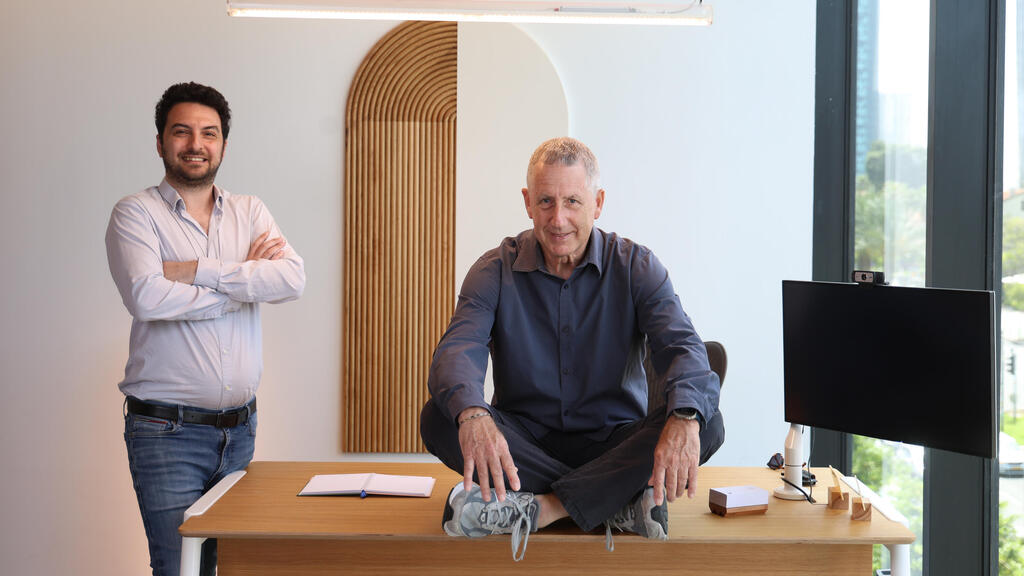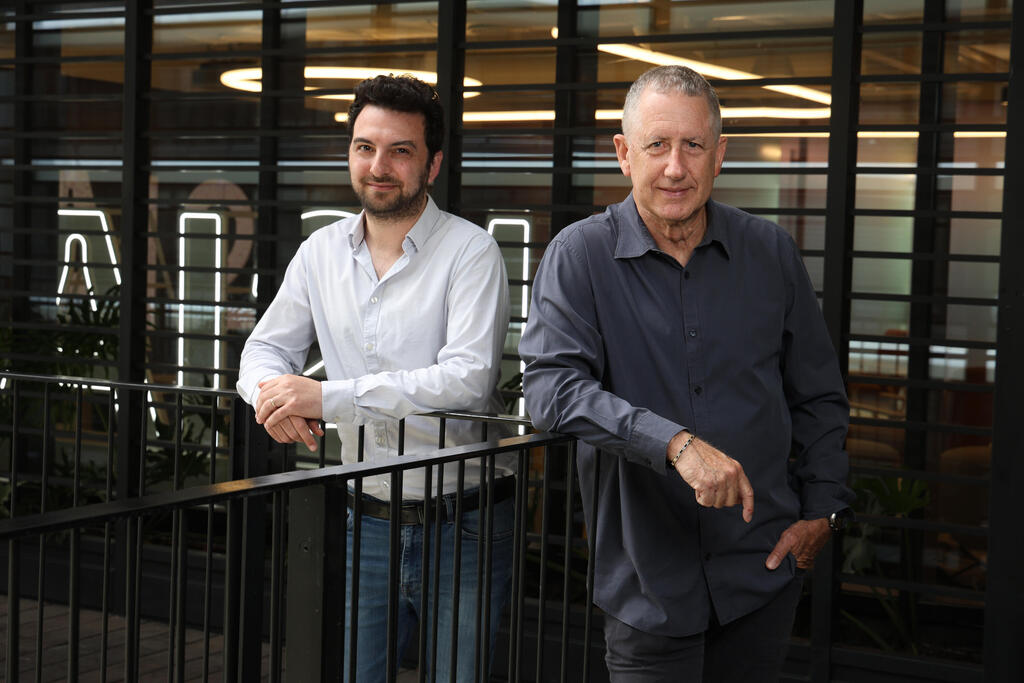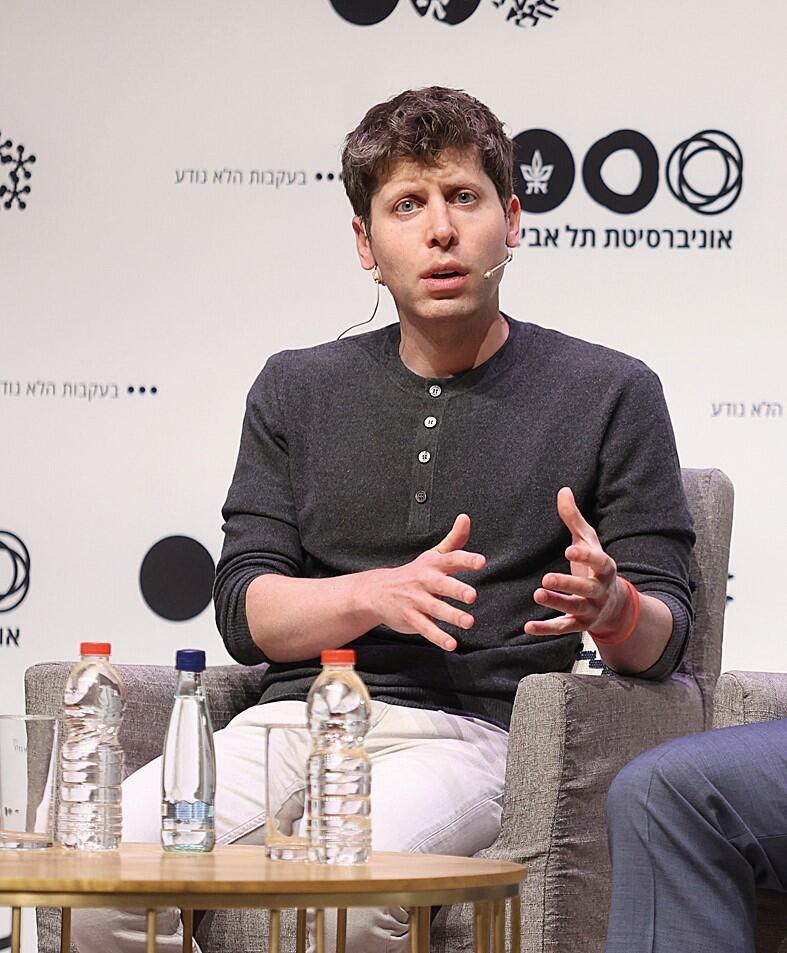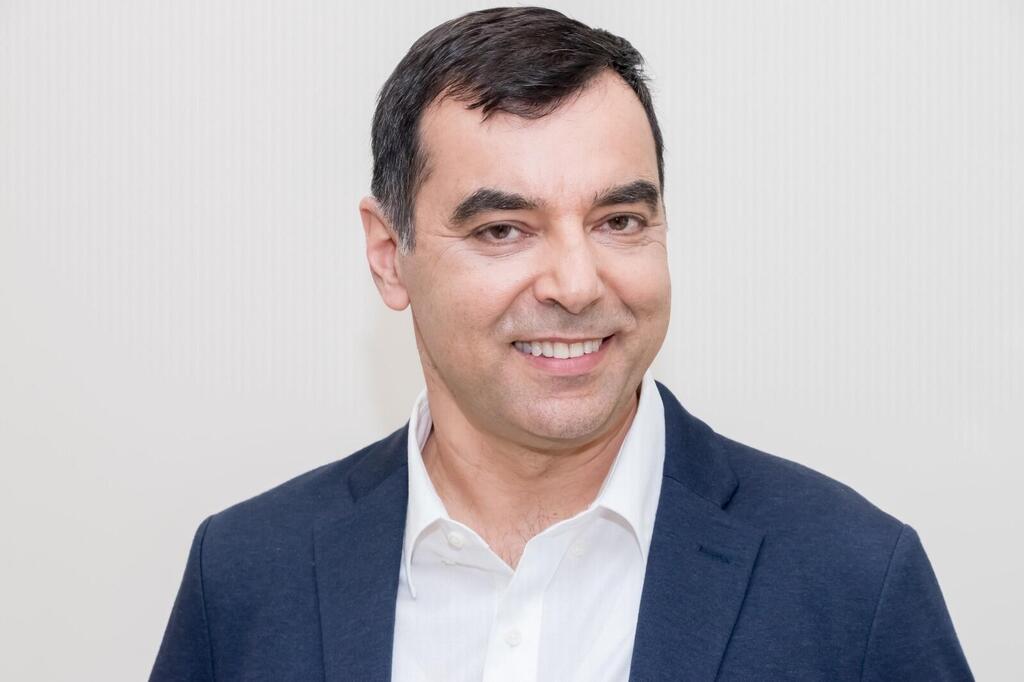Getting your Trinity Audio player ready...
We meet a few days after OpenAI's demonstration of their new language processing model, GPT-4o. During that presentation, the tech world watched as Mira Murati, OpenAI's Chief Technology Officer, showcased the model that exhibited impressive human-like conversational abilities. How tense were those moments in Tel Aviv for the people at AI21 Labs - Israel's leading company developing artificial intelligence models for language processing, and one of OpenAI's main competitors? "Of course we're keeping a close eye on it. It's directly relevant to our work, so it's not something we can overlook," remarks Ori Goshen, founder and co-CEO of AI21 Labs, with composure.
"Of course we consider what the next development might be. We don't operate in a vacuum," adds Prof. Yoav Shoham, the company's second founder and co-CEO. "I don't want to say we pretty much know what's coming, because everyone keeps their cards close to their chest, but let's say it won't really surprise us. We're developing deep technology, and there are very few companies in the world like us that are actually training models. In a field like ours, one can't just react to what others are doing. We have to set our own strategic direction."
Goshen: "Before GPT-3 was launched (in 2020 - TG), a paper detailing its capabilities was released, which we received before everyone else, along with access to the model. Within hours, our team had read everything and prepared a presentation about it for the company. This was when we were still around 40 people (today they are 270 employees – TG). No one thought it would be such a hit. I think even OpenAI themselves didn't expect it. At the time, it seemed like just another interesting development. The rest, as they say, is history."
And suddenly people around you finally started to understand what you're doing?
"It wasn't immediate. We have to give credit to ChatGPT for making the technology accessible to people and really opening their eyes to what it can do. We're in a field in which the rate of change and innovation is truly unprecedented, and this is the environment we've been operating in for six years now, since early 2018 when we started AI21 Labs. We're used to the drama."
"I don't know how he has time"
AI21 Labs is one of the few Israeli tech companies that has remained unshaken by the recent string of crises, continuing to thrive in its red-hot market sector - large language models (LLMs). These models form the brain behind the chatbots that have become an integral part of all our lives (like ChatGPT and Google's Gemini). They enable computers to converse, write, analyze, and recommend - almost like humans, with considerable concern that soon they might even outperform us. However, the rush for everything related to AI hadn't yet begun when the company's founders, Shoham, Goshen, and Prof. Amnon Shashua, set out in early 2018. Their idea of an AI tool based on natural language that would change the way humans write and read started as a sleepy genius lab. But in 2022, with the launch of ChatGPT by OpenAI, which poured vast capital and attention into the field, they soared to new heights.
Today, they lead a company valued at $1.4 billion, which completed a $208 million funding round last November. They collaborate with Amazon, Google, and Microsoft, and compete with AI giants like OpenAI, Anthropic, Mistral, as well as with models developed by Google, Meta, and X (formerly Twitter). They may soon also compete with a company to be established by Ilya Sutskever, an OpenAI alumnus who announced this week that he is launching a new company with offices in Palo Alto and Tel Aviv. Tom Nides, former US Ambassador to Israel and Deputy Secretary of State in the Obama administration, has joined AI21 Labs' board of directors. AI21's achievements have established it as one of the most intriguing companies globally and one of the most important in Israel. However, they haven't had time to bask in these accomplishments in a world where competitors are doubling their valuations, reaching amounts reminiscent of past tech bubbles.
"Because I'm ancient, I remember artificial intelligence from the 80s," says Shoham (68), who has witnessed plenty of revolutions in his 28 years as a Computer Science professor at Stanford University. "My colleague John McCarthy is the one who coined the term 'Artificial Intelligence' back in the 50s, around when I was born. In the 80s, AI was considered a great promise. In the 90s, we had the 'AI Winter', when you could hardly admit you were working with artificial intelligence. And now, in recent years, even my plumber does AI, but it's a very different kind of AI."
How has it changed since the time you were doing artificial intelligence at Stanford?
"What's changed isn't the algorithms, but rather the access to an inconceivable amount of data and unimaginable computing power. We're doing statistics on enormous scales, and what amazes even us is that when you do statistics of this magnitude, things happen that you didn't expect. Essentially, that's what has given momentum to modern artificial intelligence. Natural language processing (the application of techniques that allow computers to process, analyze, and respond to human language) is a glimpse into how a person thinks. It's difficult to do, but there's tremendous value in it."
Value that you identified could be generated in your own company?
"We started the company because we believed that deep learning (a technology that allows computer systems to mimic human brain activity - TG) is a necessary but not sufficient condition for modern AI. Let's take a simple operation like addition and subtraction as an example. Language models can do arithmetic, but not as well as a simple calculator from the 70s. To achieve a high level of reliability and accuracy, you must have processes of reasoning and inference. We understood that you need to combine both. For the first three years, we focused solely on technology, and then we said: 'Okay, we're not just a research lab, we're also a company, what's our business?' And it was clear to us that we wanted to be a B2B company, a company that sells to other companies."
Long before every CEO was looking for ways to incorporate artificial intelligence into their product.
Goshen: "Exactly. The term 'Generative AI' didn't even exist yet. AI was primarily in academia, laboratories, and large companies. But, as Yoav said, we still wanted to create real commercial value. The first stage was to rethink how people write and read today. That's how Wordtune was developed, a tool that helps people express themselves better. It caught on like wildfire."
Wordtune, which according to Shoham and Goshen has amassed ten million users, is similar to the competing tool from Silicon Valley company Grammarly, which checks spelling using artificial intelligence and suggests clearer and more sophisticated sentences than a non-native speaker might come up with. "Wordtune was released at the end of 2020, and in 2021 we already launched our platform, AI21 Studio, with our first language model, Jurassic-1, which at the time was slightly larger and a bit better in certain areas than GPT-3. It was intended for organizations and was our first foothold in the field."
Shoham was then a "professor in rehab," as he likes to say, and Goshen, now 39, was a young CEO without an academic degree but who had already achieved an exit. The third to join, Prof. Amnon Shashua, is the president and CEO of Mobileye and founder of OrCam and the digital bank One Zero. Shoham recounts how he and Goshen connected: "I had already started four companies by then (including Trading Dynamics, which dealt with online auctions and was sold for $458 million to Ariba - TG), two of which were sold to Google (including a time management application he developed with Dan Ariely - TG). When the last one was sold, we decided to return to Israel. I worked for Google US from Israel, but the idea that would eventually become this company was already taking shape in my mind. At the time, I was also involved in a project teaching programming to underprivileged populations, and that's where I met Noga, now Noga Goshen, Ori's partner, and that's how he and I met."
Goshen: "I had a company in the analytics field that merged into another Israeli company, Cellwize, which was later sold to Qualcomm. In 2017, I started thinking about my next move. In the first week we opened the company, I also got married to Noga."
Shoham: "Amnon Shashua came on board a few months after we started, and we clicked right away. I've known Amnon from academic circles for years, but we'd never worked together before. Funnily enough, I originally approached him to get funding for WeCode, this programming project for underserved communities. I remember sitting in his office at Mobileye, and after just ten minutes he said, 'Alright, I've donated to the project. What else have you got?' So I said, 'Well, let me tell you about this company I'm starting.' It really resonated with his vision for the future of AI. After a few discussions, he expressed interest in joining us, but with one condition: he didn't want to be just an investor, he wanted to be a real partner. And I've got to say, I don't know how he has time, but he's incredibly involved in the company, contributing to both our strategy and technology."
About 50,000 organizations and developers were registered on their platform, using the language models they developed, but not the large companies and organizations they were aiming for. Goshen: "I was at an event in the United States, a very exclusive gathering of 50 unicorn companies. CEOs of companies selling products in the fields of payments or human resources were saying that customers ask them, 'What's your AI roadmap for the next five years?' It's really expected of them. However, to successfully enter these organizations, we realized there are two crucial elements: reliability and efficiency. Today, in the language model market, there's a challenge with reliability, especially when you want to provide solutions for markets and fields where the cost of error is high and the model simply can't afford to make mistakes. That's why our focus is on working on reliability and efficiency. Our 'Jurassic' models bring Task-Specific Models to the market - models focused on and specialized in specific tasks, which then suffer less from problems that exist in general models."
This year, they launched a new model called Jamba. "The dominant language models today are very powerful and can do many things - but not perfectly," Shoham explains. "What we want to do is compensate for this imperfection. Models with advanced capabilities are extremely costly to run, which makes them impractical for everyday use. Consider a bank that needs to serve customers quickly - you want to provide answers within seconds, not minutes. Plus, you can't afford to pay $100 for each customer interaction. That's why optimization is crucial. At our company, we take recently developed academic models that have proven efficient - say, from about seven months ago - and combine them with models that offer higher accuracy. By merging these, we aim to get the best of both worlds. This model, Jamba, is both efficient and good. Organizations still want to customize the models according to their needs and customers, but starting with a model that's already tailored to the task they want to perform - that's more efficient than adapting a general model."
What does this look like in practice, say for a bank wanting to adopt one of your models?
"Let's say a bank has investment analysts spending their entire day poring over reports. Naturally, the bank wants to equip these analysts with tools that can summarize these reports as accurately and quickly as possible. They have two options: they can either take a general-purpose model and tailor it to their needs, or they can leverage our Task-Specific Models. These models excel at summarizing financial reports, giving the analysts a significant head start towards their objectives."
Unlike the human-like qualities incorporated into ChatGPT's latest version - which OpenAI CEO Sam Altman compared to the movie "Her" - your models maintain a more detached, functional approach.
Shoham: "Indeed, in some cases there's a considerable effort to emulate human traits, including intonation and brief speech pauses. We've created a game called 'Human or Not?' that attracted two million players within its first two weeks. It's essentially the world's largest Turing test - players have a two-minute interaction with an unknown entity. They type something, receive a response, and must deduce whether they're conversing with a human or a bot. We deliberately made it challenging by intentionally introducing errors, varying response times, and incorporating slang and emojis. It's remarkably difficult to distinguish. However, large organizations often don't want to blur the line between human and machine. Human-like voices and casual humor aren't particularly useful when you're dealing with, say, a financial reporting model for a bank."
"Raising money when needed"
AI21Labs has a strategic partnership with Amazon, which offers developers using its services access to models from leading companies, including the Israeli AI21 Labs. "Amazon's cloud customers can utilize our models and customize them to their needs." Last month, at Microsoft's Build conference, a collaboration with AI21 Labs was unveiled as part of Microsoft's initiative to broaden its AI model offerings. This move gives Microsoft customers access to several advanced models, including the AI21 Labs model. Just this month, a similar alliance was struck with Snowflake, the American data giant.
Microsoft is a dominant investor in OpenAI. Amazon has invested in the model development company Anthropic. Google has its own models. In other words, your competitors are armed with massive investments, while you're running alongside them at a relatively lower valuation, even compared to smaller companies like the French Mistral.
Shoham: "You're essentially saying, 'Come on, how can you show up with such a measly valuation of just $1.5 billion?' We believe in raising money when you need it and know what to do with it. We don't think that whoever raises at the highest valuation is necessarily doing themselves a favor. There's logic in growing at a certain pace. Growing to over a billion dollars in just a few years - that's not something you want to do casually."
Goshen: "We're guided by what we believe is right. We've raised a considerable amount, $336 million, and we're not short on cash. When we want and need more money, we'll raise more. But generating headlines about adding another billion to our valuation won't move us forward, won't provide value to our customers, and won't lead us to success."
It's more a matter of positioning against competitors, each of whom has leapt to valuations of tens of billions of dollars.
Shoham: "You're right, branding and market positioning are crucial. Some people do equate a company's valuation with its quality. But our target clients - they get it. They know the valuation isn't the whole story. What counts is whether you have superior technology and can deliver the service effectively. I don't know what our valuation will be down the road, and honestly, it doesn't preoccupy us nearly as much as our drive to develop the technology and deliver our products."
Is one of your goals in maintaining a proportional valuation to enable future merger and acquisition deals?
Shoham: "That's a natural question, but at our scale, we're not building the company to be acquired. If that were our aim, we could have done it already."
The company's 270 employees are mostly engaged in research and development, with 80 of them focused on marketing and sales, based in the US. Shoham also chairs the scientific committee of the national AI program, making him the go-to person for assessing the talent pool of skilled engineers in this field in Israel. "We have good talent, but not enough of it. If you look at how many AI researchers we have in the country on any given day, you'd find about a hundred. We need double that," he says.
Unlike in cyber security, the military doesn't necessarily create an advantage in artificial intelligence.
"That's a key point. Unlike cyber security, where much of the technology was developed in the military and security agencies before transitioning to the civilian sector, with AI the direction is reversed. It's also expensive and requires substantial resources, contrary to cyber security. So in Israel, we need to make increasing human capital in this field one of our primary objectives. Here at the company, we have the privilege of recruiting the best minds. I don't want to sound arrogant, but we're unique. No other company in Israel is developing language models at this scale, so many of those best minds want to join us. This is the fifth company I've been involved in managing, and I've never seen such a concentration of talent in one place -- which, by the way, is somewhat challenging because managing exceptional talent isn't trivial."
Yoav, you spent 28 years at Stanford, and now you're witnessing the turmoil on elite U.S. university campuses from afar. What's your take on this?
"I wasn't pleased with what happened at Stanford. It's deeply troubling because it reveals underlying processes in American society, Western society, and among the younger generation. They genuinely have good ideals, but sometimes they're uninformed and guided by simplistic notions of good and evil, conqueror and conquered. This is exploited by anti-Israeli and sometimes anti-Semitic forces, which is a very serious problem. So far, I don't see my Israeli colleagues being ostracized there; quite the opposite. We're in a technological field, where the scenes we see in the media are less dominant than in other areas like humanities and social sciences."
What's the status of Israel's national program for the AI revolution?
"Look, I don't know of any country in the world that doesn't have some sort of national effort in this field. There's no country that hasn't set this as a goal. I don't want to call it an arms race, but everyone understands that this is a strategically crucial technology for a nation. Israel won't win here because it has more resources. The government has issued a tender for the acquisition of GPUs, with plans to purchase an initial batch of 1,000 units, potentially scaling up to 2,000 if funding permits. Do you know how many processors Saudi Arabia just bought? 40,000. So we won't win because we have more, but through innovation and application of AI. I see many projects in Israel that I call 'moonshots' - flagship projects with high risk and high reward."
Goshen: "There's a positive sentiment in how Israel is perceived globally in AI development. I was at the World Economic Forum in Davos, and Hong Kong's Finance Minister invited me for a meeting. At first, I didn't understand why, but then they clarified that they see Israel as an important market in this field. I realized that there's already international awareness - there's a fundamental respect for Israel's technological prowess."





